There is a Middle Eastern scenario that was dreamed up approximately one hundred years ago. That scenario was actually shaped on the basis of a project that some evangelical Christians dreamed up on the basis of the Bible, and has actually been set in motion. Under this plan, the Middle East has to be broken up and the Battle of Armageddon, which they believe will take place in the near future and in which all Muslims and most Jews will be killed, must be initiated. According to evangelical belief, that battle is a portent of the return to Earth of the Prophet Jesus (pbuh) and absolutely must take place. (In fact, this battle is a sign of the End Times. What those evangelicals who believe that this battle will take place do not know is that Armageddon has already started and is still continuing. The 2003 Iraq War is the starting date of the great battle that is the portent of the End Times. This is the war -God knows the truth- identified as Armageddon in the Gospels and described with all its signs in the hadiths and the Torah. Ever since then there has been no end to the conflicts in the Middle East, and the blood of Muslims has constantly been shed, and is still being spilled today. Therefore, the Armageddon that the Evangelicals expect to take place in the future has in fact been going on since 2003. The anticipation of a greater war after this is leading these Christians into a great many errors concerning the Middle East. Further detail on this subject can be found in the chapter “Some Christians’ Error Regarding Armageddon” in Harun Yahya’s book Christians Must Heed Jesus.)
Of course, not all Christians hold such beliefs and expectations; not all Evangelicals have such expectations, either. However, although those Evangelicals who do expect such a great battle are not many in number, they are quite influential and are able act together in this respect with many different views and people who have plans for the Middle East. The main proponents of the view in question today are the neo-conservatives (neo-cons). The neo-cons are actively working, particularly in the US, on plans for the Middle East.
Let me say that the intention here is not to criticize these Evangelicals or neo-cons. These people may well think that they are doing the right thing in the light of their beliefs. The aim here is to point out that there are a number of errors in this objective and the path and methods adopted in the light of that objective, as well as to reveal the cost of such errors that will be made in the Middle East. If the facts on these matters are set out, there will be a much greater possibility of building a better and more peaceful Middle East together with the neo-cons, America and Europe.
 |
To return to the 100-year plan, the most essential condition for this plan is to have the countries of the Middle East ready for war and turmoil. This plan has been relatively easy to put into operation because of the divisions among Muslims and their adoption of a false conception of religion based on superstitions. The Middle East is now suffering the worst turmoil since the fall of the Ottoman Empire. However, the real target of these plans for the Middle East is the area of Mesopotamia because, according to the belief in question, that is where Armageddon will take place and where dominance will be established.
Mesopotamia, as is known, is a region that covers the Southeast of Turkey, the Southwest of Iran and a part of Iraq and Syria. The important thing about the area is that it is also predominantly where Kurdish people live. Therefore the longstanding aim of Evangelical Christians and their political allies is to break up the powerful states in the region – Turkey, Iran, Syria and Iraq – and to establish a new Kurdish state there. That state must have two important features; it must be an unconditional ally of the U.S. and Europe, and furthermore it must be a pawn that goes along with all the demands of the U.S. and Europe.
This puppet state will thus provide the West with a highly strategic area in the Middle East and at the same time provide the means, the climate and the location for the awaited war. The people of the region will no doubt be the first community to be slaughtered in that battle. Although this objective is never stated explicitly, this is the main idea that lies behind the belief in question.
This plan is in fact in action. The Kurdish Autonomous Region, the foundation of which was prepared when the area to the north of the 36th parallel was declared a safe zone after the Iraq War, was established on Iraqi territory. The worsening turmoil in Iraq at this time has led to the Kurdish autonomous administration's making statements saying, “We may declare independence.” As a matter of fact, the Iraqi Constitution permits that. So long as the inhabitants approve, the autonomous administration can break away as an independent state. However, the present moment is too early for that to happen, because similar conditions also need to emerge in Iran, Syria and Turkey. Until then, the Kurdish autonomous administration in Iraq will continue to exist as a de facto established state.
The second stage in the plan, which is the awaited progress in terms of the Syrian Kurds, also appears to have been achieved. The Kurdish administration here, which is divided into cantons, frequently declares autonomy but because of the ongoing civil war in Syria, it fails to find an audience and then reverts again to the already existing system. However, as a result of the bombing carried out by the coalition forces, the Turkish-Syrian border has been almost entirely abandoned to the PYD, one wing of the PKK, that has established almost total control in the region, and the way has been left open for them to establish a de facto state. In this particular stage, there is one noteworthy point, which is the extreme sensitivity displayed by the Western countries towards the Kurdish region in Syria. Let us examine this under another heading.
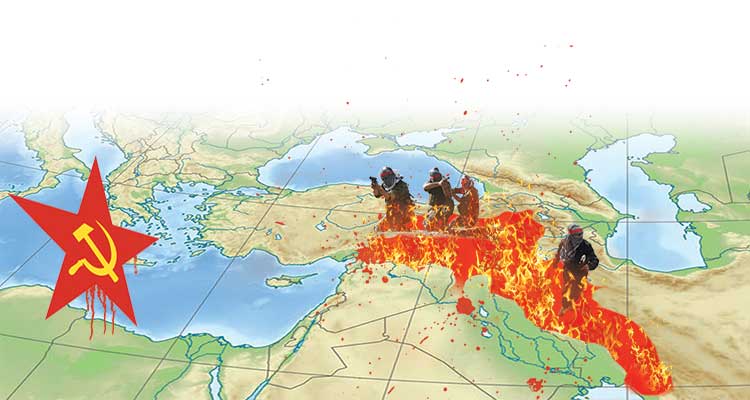 |
| There was a plan for a Kurdish state dreamed up 100 years ago, based on Iraq, Iran, Syria and Turkey, where the Kurds predominantly live. A pro-Western puppet state would be established in the region, and the foundations for the evangelical plan would be laid through that state. |
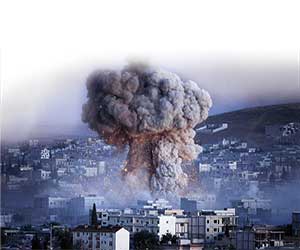 |
We know that the Arab Spring protests that broke out in 2011 had a particularly damaging impact on Syria. It will be remembered that ISIL (Islamic State of Iraq and the Levant, or Islamic State as of June 2014), which became increasingly powerful on Syrian territory, took over a number of strategic points and moved into Iraq. The interesting thing is that as ISIL took over areas such as Ar-Raqqah and Deir ez-Zor, cities of strategic importance in terms of oil and their proximity to the border, they captured Fallujah, Ramadi and eventually Mosul in Iraq and assumed control over the Turkmen town of Tuz Khormato, then continued to move through Al Anbar governorate and approached the Iraqi capital Baghdad. The West had remained silent so far, but when ISIL changed its existing plan and started targeting Kurdish areas, the West went into action. The moment an attack on the Kurdish region in Iraq was sensed, the West, which had until then turned a deaf ear to calls for action against ISIL, established a powerful coalition to protect those areas. The second and more important impetus came with ISIL’s attack on Kobane.
Readers will remember that after allowing safe passage for civilians in the canton of Kobane, ISIL then initiated a guerrilla operation against the PYD (the Syrian wing of the PKK terror organization), the controlling force in the area. Coalition forces rapidly and unwaveringly lined up alongside the PYD and started bombing occupied areas and providing military assistance for the YPG, the armed forces of the PYD. At that point, as if in agreement, the entire Western press made Kobane their main story, gave the impression that a tragedy the like of which has never been seen before was unfolding, while the mainstream TV channels covered almost nothing else. A massive support campaign, the like of which has rarely been seen, was initiated on the social media for Kobane. An extraordinary international protest was started, as if this tiny town were the only place that had been captured by ISIL. Yet ISIL, which declared that it had founded an “Islamic State” while all this was going on, had established its own system in key cities such as ar-Raqqah, Mosul, Ramadi and Fallujah. It had imposed its own educational curriculum, enforced its own laws and set up its own judicial system. Yet nobody even mentioned those places.
Of course we have no wish to see anyone anywhere, be it in a village, town, city or country, being wronged; the people of Kobane are our people. Indeed, Turkey was the only country to exhibit any humane sensitivity in the immediate wake of the attack on Kobane, admitting some 200,000 Kobane Kurds as refugees. Consequently, the people of Kobane were already placed under protection.
It also needs to be stated that it is not possible for us to take part in the consortium known as the coalition, established to carry out military operations against ISIL. In the same way that we did not support the coalition’s military operations aimed at Mosul, ar-Raqqah or any other area in order to neutralize ISIL, it is not possible for us to support attacks aimed at Kobane. Peaceful solution can only be brought to the region through a rational, scientific approach, not through the use of weapons. Arms have never provided a solution, and can never do so.
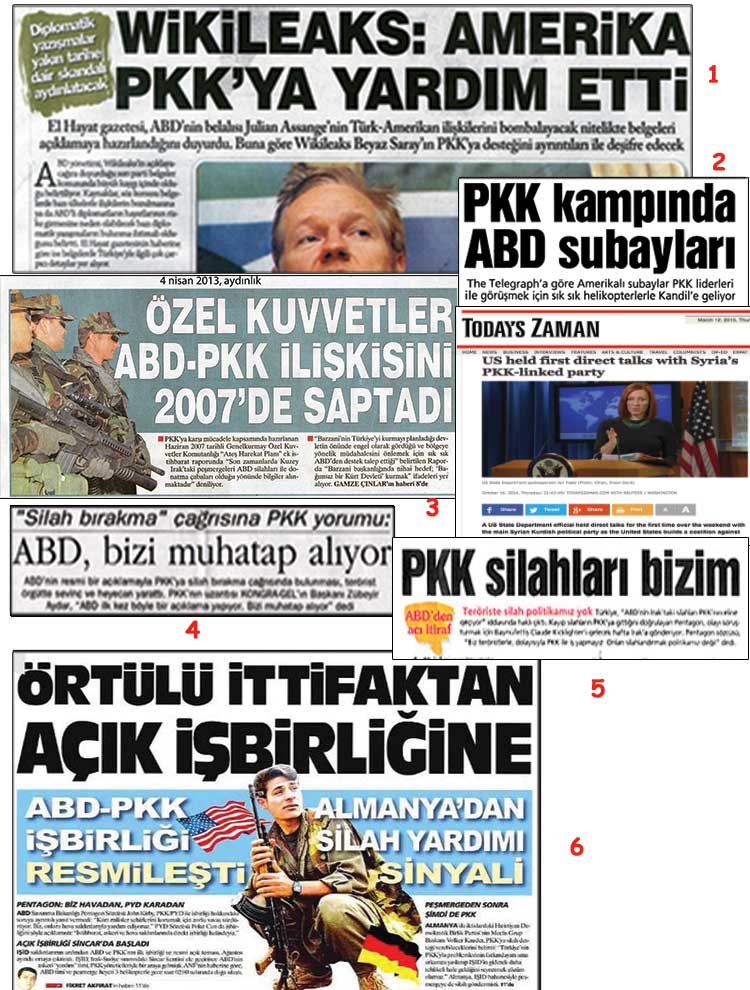 |
| 1. November 26, 2010, Bugün - Wikileaks: America helped the PKK |
| The West’s worst mistake in terms of the planned Kurdish state was to believe it could achieve it by means of the PKK. That is why it backs the PKK at every opportunity. |
This point will be explained in detail in the pages that follow.
What we wish to note here are the West’s sensitive areas. The way that coalition forces only took immediate action when Kurdish areas in Iraq and Syria were captured once again confirms that these lands are the most vitally important ones for the West. The turmoil and fragmentation in Syria and Iraq were not taken all that seriously. That is because under the plan, the Middle East needs to be brought to this state through a range of factors. That is the reason why coalition forces had no qualms about intervening the day Kobane was occupied but said not a word about the civil war in Syria.
No harm must befall the Kurdish region, however. The West’s protectiveness over the Kurdish region emerged perhaps most clearly during these events. And this is now being openly discussed by numerous Americans and Europeans.
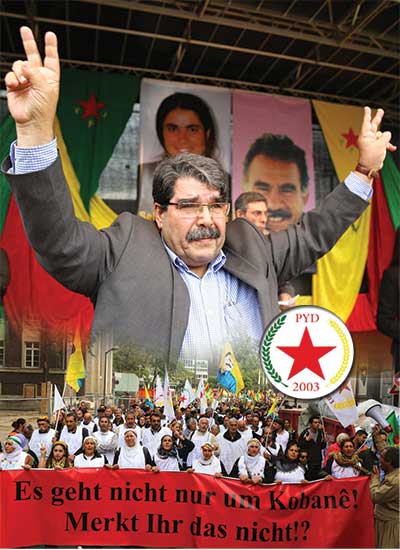 |
| The PYD in Syria is nothing but an extension of the PKK, and is a terrorist organization that regards Öcalan as its leader. Indeed, PYD leader Salih Muslim gives speeches and holds meetings under posters of Öcalan. |
The most striking thing about this protectiveness regarding Kobane has been the speculation over the PYD (The Democratic Union Party, Kurdish: Partiya Yekîtiya Demokrat), which controls the Kurdish part of Syria. This indoctrination conducted especially by the Western media and some neo-cons is sometimes deliberate and sometimes stems from ignorance. Various points of which many people are unaware about this subject therefore need to be set out.
The PYD was founded in 2003 and is an extension of the PKK. It was founded by those members of the PKK who remained in Syria after Öcalan and other PKK leaders had to leave the country because of pressure from Turkey. Although, just like the PKK, it has today assumed a mask of imperialism, it is also, just like the PKK, communist and Leninist. Abdullah Öcalan is the spiritual leader of both groups. Its official identification states that it was founded as an organization affiliated to the PKK, that it recognizes Öcalan as its ideological leader and it declares Kongra-Gel (the political wing of the PKK) as “the supreme legislative authority of the Kurdish people.” Indeed, information regarding the PYD appeared in the second indictment prepared in 2012 in the context of the KCK investigation in Turkey. The indictment stated that Öcalan sent a letter of collaboration in April 2011 to Bashar Al-Assad through his lawyer, in which he said that the PYD would support the regime in return for being given administrative powers in the north of the region. 1
In October 2014, Mardin High Criminal Court No. 2 sentenced a person from Rojava who had been brought to Turkey to prison on charges of being a member of a “terror organization” on the grounds that he was from the YPG. With this court ruling, the PYD and YPG, which had not been on the list of terror organizations before, were recognized as terror organizations.
Thusly, Salih Müslim, co-leader of the PYD, holds PYD conferences under posters of Öcalan, and YPG militants carry pictures of Öcalan in their pockets and put them up in their homes.
Retired Major General Armağan Kuloğlu says the following on the subject:
“The YPG was not founded as an independent terror organization. It is an extension of the PKK in the north of Syria. When events broke out in the north of Syria, a Kurdish organization appeared in the north. The YPG was established by the PKK as an organization controlling the area and the people in it. It is an organization under the control of the PKK; it is an extension of the PKK. Since the PKK is a terror organization, the YPG is also a terror organization.” 2
It is interesting that a fact known to almost all politicians and explicitly admitted by the PYD itself, the link between the PKK and the PYD, should still somehow be denied by some individuals and countries. It is of course a fact that many politicians and writers in the West are genuinely unaware of the truth about the PYD in Syria. In their eyes, there are people of ethnic Kurdish origins in the southeast of Turkey and northern Syria, and these people are only waging a struggle for freedom. It is because of this lack of information that they fail to grasp the reason for Turkey’s reaction to these alleged “freedom fighters” and why Turkey refused to support the “Kurdish fighters” in the region during the Kobane operations. They vehemently accuse Turkey and the Turkish government of ethnic discrimination. What is truly surprising is that there are even politicians and writers in Turkey who do this.
 |
| Protests were held in almost all of Europe following ISIL’s attack on Kobane, and pressure was put on Turkey. Yet the administration in Kobane was that of the PYD, an extension of the PKK. The protests in support of Kobane in Europe had posters of Öcalan and PKK banners. |
The fact of the matter is this; the people who fought ISIL in Kobane are not “Kurdish fighters” but a terrorist group that is an extension of the PKK. The PKK is a despicable terror organization that has been engaging in separatist propaganda in Turkey, has been attacking us repeatedly and has inflicted terror on our Kurdish citizens in particular and has martyred tens of thousands of people and our troops for more than 30 years. One would have to be extraordinarily lacking in awareness or have ulterior motives in order to want Turkey to help such a terror organization in Kobane. Of course the Turkish government will not help a cowardly and treacherous terror organization that has been stabbing it in the back and trying to break the country up for years on end. The people fighting ISIL in Kobane are the very same people who have been the enemies of the Turkish people for more than 30 years.
Certainly, those people who accuse Turkey of discrimination are not only those who are uninformed about this subject. Various intelligence agents, politicians and writers who are trying to prepare the ground for the establishment of a Kurdish state in the region, despite being well aware of the true nature of the PYD, are desperate to turn the situation there to their own advantage. Almost the entire mainstream media have been used to that end, and American and European politicians have issued serious, if specious, criticisms of the Turkish government. Time and time again, Turkey has been asked why it refuses to help the terrorists of the YPG, and Turkey was placed under international pressure from an international dictatorship. Right now Turkey is perhaps the only country in the history of the world to be asked “Why are you not helping bloody-minded terrorists whose hands are red with the blood of your citizens?” This extraordinary state of affairs is somehow never seriously mentioned by almost anyone, and Turkey was made the target of an expertly planned smear campaign by the international media dictatorship in particular.
Let us make it clear that the PKK has been greatly pressuring our Kurdish citizens in the Southeast of Turkey for many years now. Kurds constitute the great majority of the people it has slaughtered. The same thing applies in the Rojava region in northern Syria. Our Kurdish brothers there have for years been violently repressed by the PYD, the extension of the PKK.
Indeed, when the civil war in Syria first broke out, the first Kurdish refugees to reach Turkey from Rojava came from the Jazira Canton. These brothers of ours explicitly said that they were fleeing, not persecution conducted by Al-Assad, but by the PYD. In fact, since the PYD was collaborating with Assad in Syria, Assad never attacked those areas at that time. Later on, people sought to take advantage of the turmoil in the country and seized the opportunity to flee persecution conducted for years by the PYD and sought refuge in Turkey. Consequently, in total contrast to the image the PYD seeks to present to the international community, the PYD is an extraordinarily dangerous terror organization that has imposed a Leninist system upon and oppresses its own people, just like the PKK.
What Abu Abdullah al-Kurdi, the leader of the Syrian Kurdish Islamic Front which speaks for the religious Kurdish community in Rojava, said about this matter is highly significant; “We came out of Al-Assad’s dungeons and entered the dungeons of the PYD. These two are the same for us.” 3
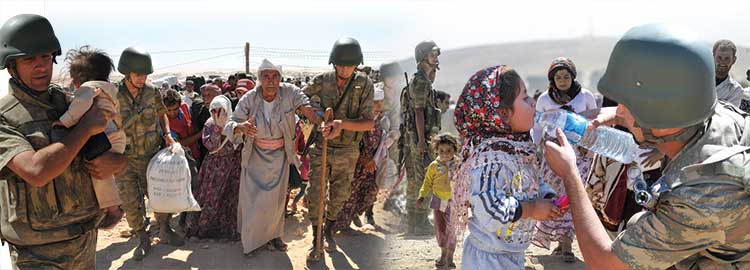 |
| The criticisms of Turkey on the subject of Kobane are all logically flawed. Of course Turkey will not support the PKK in Kobane. At the same time, however, Turkey has done what no other state in the world has done, admitting the entire population of Kobane and even literally building a town for them. The Turkish people and military have mobilized to ensure the comfort of our Kurdish brothers from Kobane. Syrian Kurds shed tears of joy, not solely because they had escaped ISIL, but also because they had escaped the PYD and were now in safety on Turkish soil. |
Indeed, in the wake of events in Kobane religious Kurds confirmed in a press statement that they never supported the PKK: “There is no doubt that Muslims are strong enough to respond to these cowardly gangs [members of the PKK] who are fleeing Kobane like rabbits.” 4
As it can be seen, the Kurdish people in the Kurdish area of Syria, Rojava, regard the controlling PYD as a scourge and want to be freed from their oppression. It should be remembered that the same thing applies to Turkey, that the Kurds in Turkey can never be regarded as one with the PKK and that the Kurds in Turkey are always among PKK’s targets.
The Human Rights Watch report is most significant in proving the situation in question in the Kurdish part of Syria. According to this report, PYD forces are implicated in arbitrary arrests, human rights violations and unsolved killings and kidnappings. HRW met with a number of detainees in prisons, who stated that prisoners were held in the absence of any arrest warrant, prevented from speaking to their lawyers, not brought before the courts and were constantly beaten by officials. It is also reported that their children were given guns and used as militants, and dozens of other human rights violations were listed. The report explicitly emphasizes that the PYD is directly part of the PKK terror organization in Turkey and says that ever since the Syrian government pulled out of the region because of the civil war in 2012, the organization has behaved arbitrarily with local courts, prisons and police. The report emphasizes that the practices in question are worrisome. 5
On that basis, it is very important to properly assess the fact that Kurdish people living there have been fleeing to Turkey to get away from persecution by the PYD since 2011. The wretched people there are trying to escape a Leninist terror organization that has declared control over the region. The fact that they prefer to go to Turkey and know they will be safe there should be an important sign for the West, which either distorts or fails to grasp the situation. Turkey proudly and lovingly embraces all those who flee to her and stood up for these Kurdish brothers of ours in a magnificent way and ensured that they can live in security: Yet at the point where we are today, it is Turkey that is being blamed for not helping the PYD terror organization in the Kurdish part of Syria. Due to the huge efforts made by the global media dictatorship against Turkey, very few people are aware of this remarkable state of affairs.
Readers may be wondering how we can describe the PKK and the PYD as Leninist organizations when their supporters seem so imperialist, receive direct support from the U.S., are favored by Europe and hold U.S. flags in their hands. The reason is this; the PKK and its extension the PYD have worn an expertly crafted mask, particularly since the early 2000s. This strategy, which the PKK was forced into adopting in the wake of heavy defeats inflicted by Turkey, was strengthened by the U.S. occupation of Iraq. At that time Turkey refused to allow military forces to enter Iraq from Turkish territory and with that decision, Turkey became closed to all interventions against Iraq. Consequently Turkey had no means of taking action against the PKK camps on Mount Kandil.
The PKK seized this opportunity to give the impression of being a U.S. ally, using the Iranian card against the U.S. It was no longer any secret by then that the U.S. administration of the time had sent various forms of aid to the PKK camps north of the 46th parallel, a declared safe zone. The PKK therefore emerged as an imperialist, Kurdish nationalist movement and an important ally. The U.S. and the other coalition forces were taken in by this mask and concluded that the organization was an ideal candidate for the plan of a Great Kurdistan. That imperialist mask benefitted the PKK enormously after that.
So convincing is this mask that Westerners, who regard a Kurdish state in the Middle East as being to their advantage, were very willing to be taken in by it. The PKK made great use of that desire and suddenly began adopting imperialist language. That mask deceived communists and extreme leftists, even in Turkey. This cunning and well-crafted stratagem is in fact a well-known communist tactic. In order to see that, we need to look at previous examples from history.
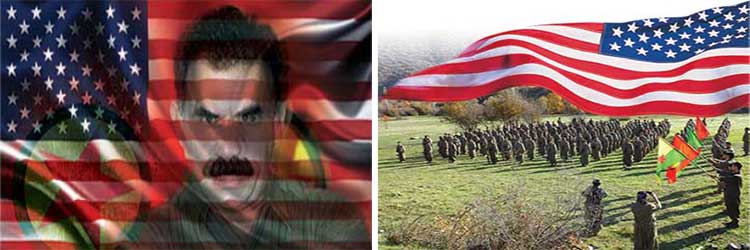 |
Stalin, for example, was one of the bloodiest representatives of the communist ideology and used extremely harsh language against religion, as communism demanded:
"We carry on and will continue to carry on propaganda against religious prejudices. … The Party cannot be neutral towards religion and does conduct anti-religious propaganda against all and every religious prejudice…" 6
That same Stalin who spoke of anti-religious propaganda against all faiths signed an accord with the Russian Orthodox Church in the early years of the Second World War, permitting the reopening of tens of thousands of churches and the rebuilding of the hierarchy under Church leadership. In addition, Islamic Sharia was recognized in the south, Buddhism was supported in the east and anti-Semitism was strongly disapproved of. There was just one reason for that strange accommodation; to be able to eliminate fascism, which had escalated into an existential danger to communism in the war and to attract support in the fight to defeat Hitler. Stalin used the influence of the Church for a long time in order to oppose the Nazis.
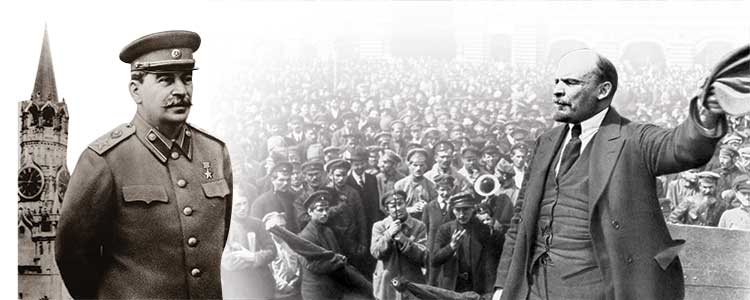 |
Lenin set about a short-term change of economic policy in order to reinvigorate the collapsing Russian economy and reach the levels of capitalist countries, and adopted the principles of capitalism. Under this system, known as the New Economic Policy (NEP), a policy allowing small businesses to continue with the aim of making a profit, as in capitalism, was adopted. The Bolsheviks regarded the NEP as a temporary measure, and those policies adopted from capitalist economy were criticized within the party. The NEP, a policy at complete variance with the communist conception of the economy, was adopted as an essential measure and then abandoned once sufficient economic growth had been achieved. The same tactic can be seen today in China’s Hong Kong policy.
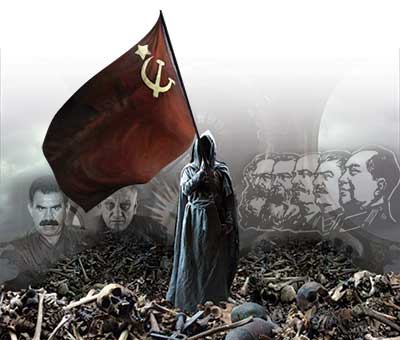 |
Another interesting example of the communist shape-changing and withdrawal policies can be seen in their approaches to the family and the state. As we have seen in detail in previous sections, communism is violently opposed to the family and the state and regards these two institutions as obstacles in the fight to return to communal societies. Nonetheless, communists generally resort to a stratagem and say that a strong state is needed in order to do away with the institution of the family and in order for the state to be strong, the institution of the family has to be strengthened first. They therefore first take one step back and strengthen the family. The communist state is thus strengthened, after which the institution of the family is gradually done away with. The next stage involves doing away with the state, and that is easy for communists in a society with no more family or religious values. 7
Communist tactics have been applied in a determined manner by most communist leaders and have been regarded as essential for communism to grow and flourish. To put it another way, all possible masks are worn for the sake of a powerful communist state. It was clear that Stalin would never support the churches; however, when circumstances so required, a mask was adopted with great mastery. And no concession was made on that deceptive appearance.
The PKK are currently employing the same technique. The PKK realized that the way to settle in the region and obtain autonomy was by drawing closer to the West. They are aware of the fact that standing with a communist identity would attract a negative response from the world superpower, the U.S., and that such a reaction would inevitably result in failure.
In addition, despite being fiercely opposed to the state system and organized with the intention of destroying it, the organization changed its way of speaking and began describing the existence of the Republic of Turkey as a guarantee for them; that was a separate tactic. Of course they really imagine that in the autonomy stage, the Republic of Turkey would be a guarantor for them and that the republic would be their main source of funding, weapons and infrastructure. That is why the PKK and its supporters are always talking about the importance of the existence of the state. The real aim, however, is once they have established a state of their own, to eliminate all the states in the region, including the Republic of Turkey, and to proceed in this fashion until the objective of a communist world state has been achieved. This talk is therefore no more than a tactic.
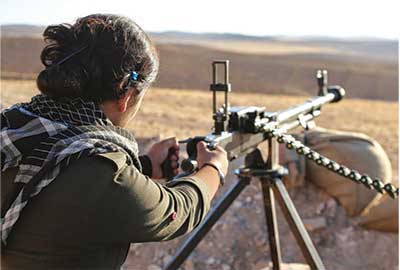 |
As the PKK began the tactical change in question in the 2000s it also began admitting women to the organization. Major divisions had broken out within the organization at that time, and it had been weakened and suffered severe losses. Consequently, the real aim behind the admission of women to the Party was to use women as fighters to encourage male terrorists. As the PKK began producing female fighters from that time, the way to competition among the male majority was opened and men were encouraged by that means.
From that time on, the PKK made women a significant part of its mask of imperialism. It manifested itself as a group that spoke of women’s rights and giving women prominence in the Middle East, where women are all too often regarded as second-class citizens on the basis of radical ideas. This is a very sensitive point for the West, and the PKK skillfully exploited this sensitivity. It attracted the West’s attention as the only community to speak of women’s rights in a fundamentalist region that attached no value to women at all.
It needs to be made clear that it is of course essential to espouse the freedom and superiority of women, and that it is one of the basic principles of our religion. In that sense, the Middle East is a very backward region, the main reason being that Islamic territories long ago turned away from the Qur’an toward superstitions instead. Turkey must be a pioneer when it comes to valuing women and must represent an immaculate role model for the Middle East.
The subject of criticism here is not what the PKK says on the subject, but its hypocrisy. The PKK has adopted this language and these policies regarding women solely because that is the easiest way of currying favor with the West. What women inside the organization say, however, suggests the very opposite of those fine words.
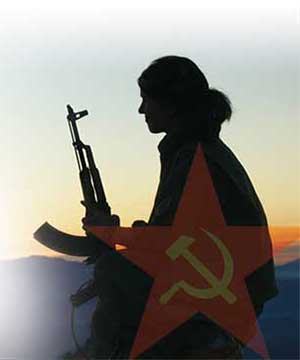 |
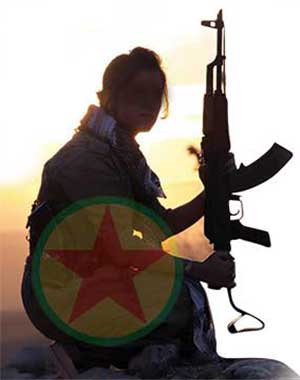 |
One female PKK member, code-named Zelal, says:
“I criticized Öcalan for his attitudes and policies. I criticized the organization’s internal democracy and people’s backwardness... They put me in jail for two months. When I came out, Öcalan accused me of speaking against him, in the presence of 500 people in a training area. One has no right to say anything against a deity. If you speak against a deity, you will be struck down. In other words, he ascribed divine status to himself. I wanted to leave the organization, but they threatened me with death. I had never been so terrified in my life.” 8
The person code-named Bese, who was active in the organization during the transition in question, says:
“When I joined the PKK I was up in the mountains. I had a gun, so I thought I was free. But as time passed, I realized this was not freedom. Because I had no identity of my own. I could not freely express my ideas or criticisms. I wanted to leave the organization, but I could not leave.” 9
A woman by the code-name Leyla says:
“Nothing was done about freedom for women in the PKK apart from things done on the symbolic and show level. And what was done just damaged women’s freedom a bit more. Because it was Öcalan, a man, who developed this ideology in the name of women, organized them and took and implemented all the decisions. I was free before joining the PKK, too. I had no individual opinion regarding the present or future in the PKK, nor could I ever have.” 10
 |
| Necati Alkan, Symbols, Actors and Women in the PKK |
The writer Necati Alkan said this in his book written on the basis of his own observations and interviews:
“Women, who were given various roles and duties by the PKK from the 1990s on, became the main force keeping the organization alive. All the women interviewed said that the ‘organizational structure’ would collapse if that force were to leave. Ronahi says, ‘If there were no women, you could not keep the men in the organization,’ Beritan says, ‘Men remain up in the mountains for the women,’ Ejin says, ‘Not one man would remain up in the mountains if it were not for the women,’ Revşen says, ‘If the women left the organization nobody would remain up in the mountains,’ and Pelin says, ‘if the women left, the men would not remain up in the mountains for a moment.’ All of these comments are highly significant in this context.” 11
In fact, according to Alkan’s analysis, women, who were regarded by the PKK as “slaves to be freed” in the early years, were referred to as “comrades” from the 1990s when they began taking part in armed attacks and as “goddesses” when they began taking part in suicide attacks from 1996. However, despite all this purple prose, it appears that in actual practice inside the organization, women are looked down on by men, not regarded as equal and undervalued. Many women who were uneasy at the discrepancies between the organization’s words and deeds and its promises and actions wished to leave it. Some escaped, and others were caught trying to escape, denounced as traitors and punished. 12
It is no surprise that despite all that talk, women say their only role in the PKK was “to be used.” Women have always regarded as worthless entities under communist systems. The same thing therefore applies within the PKK. Indeed, since as a result of his Marxist-Leninist ideology Öcalan regarded family, the law, education, religion, tribe as upper structure establishments, in his first writings he referred to women as people who “lower and debase men.” 13
Furthermore, since communism is an ideology that desires a communal system, there can be no question of “women’s worth” in such a system. Under the system desired by communism, women are regarded as communal property, just like children and all other goods. In an environment in which there is no family and moral system, in which everything is regarded as a "commodity" to be exploited in the communal arena, the kind of a "value" that could be attached to women could easily be understood.
The PKK wears the same mask when it comes to religion. Western politicians and writers are generally taken in by the “moderate” Muslim impression given by the PKK, and the organization scores very highly in the West under that guise. Some Western commentators point to the fact that the Middle East has turned into a sea of blood because of radicalism and consider an ally coming forward with moderate statements quite suitable for their own norms. Indeed, the author Bernard-Henri Levy sets this out explicitly: “[In Kurdish areas] one finds a level of gender equality, a respect for secularism and minorities, and a modern, moderate, and ecumenical conception of Islam that are, to say the least, rare in the region.”14
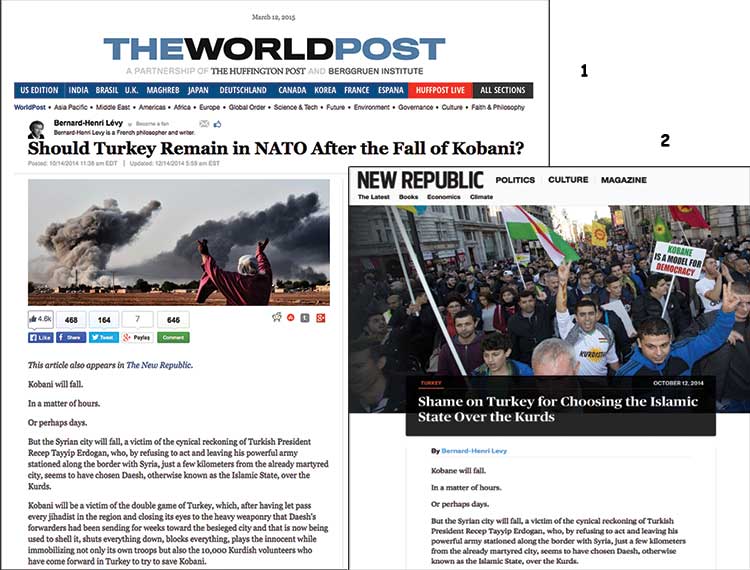 |
| March 12, 2015, The World Post (The Huffington Post) |
These key and misleading factors make an ally that can be well used in a region of strategic importance that will also be well used, highly valuable for the West. Yet this is just another one of the PKK’s deceptive tactics.
As we saw in detail with supporting evidence at the beginning of this book, communism emerged together with the ideology of atheism, and all communist leaders have in fact engaged in atheist propaganda. The concepts of religion, morality and family will be abandoned in the communist state they plan to found anyway. The attitude of the PKK leader Öcalan who once said, “I broke away from God and went past God,” (surely God is beyond that) regarding religion has also been set out in detail in preceding sections. Indeed, the PKK was shaped around that irreligious ideology. Consequently the fact that the PKK started using a perception of moderate Islam after a certain date is nothing but a convenient facade. They are opposed to religion of all kinds yet some people in the West believe what they want to believe, and they fondly imagine that the PKK embodies the model they picture in their minds for years, and are flat-out being deceived by it.
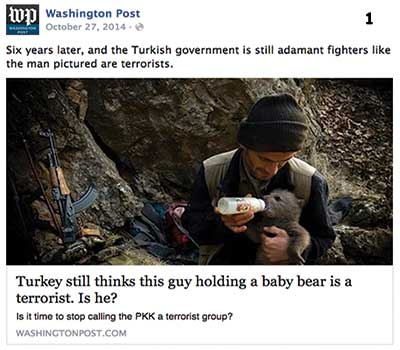 |
| November 27, 2014, Washington Post |
| The depiction of a terrorist as a symbol of love and compassion, and in one of the world’s great newspapers, is important evidence that the media dictatorship is acting as part of the plan for the Middle East. |
As we have already seen, in order to carry out this 100-year plan, some Western writers have embarked on an intensive operation since they genuinely believe in the mask being worn by the PKK. We, of course, need to make mention of the dominant global media dictatorship here. The countries, people, systems, ideologies and institutions that the world’s leading mainstream media organizations will support or oppose have all been defined right now. The project is based upon supporting those supported by the powerful and denigrating as much as possible those they do not support; those that are part of the global media can never step outside that line. News reports must be broadcast in that context, and commentators must write their pieces in that context, too. Since the system in question is a dictatorship, anyone who fails to abide by these rules should definitely be marginalized. Under this system, which the whole world is aware of but silently acquiesces in, perception engineering is carried out accordingly. Those in charge of the global media easily achieve their aims by involving various people they think they can use in the region in question.
The global media have recently begun using this technique quite intensively for the PKK. Under the influence of the perception management in question, some countries even started to talk about taking the PKK off the list of terror organizations. So much so that members of this treacherous organization, one that has ruthlessly murdered Turkish soldiers and Kurdish people over the last 30 years and that knows nothing other than shooting people in the back, were photographed holding a baby bear, under the caption: “Turkey still thinks this guy holding a baby bear is a terrorist. Is he?”15
Depicting a terrorist as a symbol of affection in one of the world’s leading dailies, and selecting Middle Eastern writers in particular to give that impression, is a tactic of this perception engineering in question. The Western secret states implement this tactic using such crude and well-known methods, and so blatantly, that it does not care whether people realize its real aim, or not. After all there is no one who is capable of criticizing or putting a brake on the media dictatorship in question.
The impact of this perception management is incalculable. With the information they glean only from these sources, people in the West in particular regard the PKK as an innocent community and are unaware that it is in fact an exceedingly dangerous organization that treacherously shoots people in the back, that has been killing innocent people for decades and that also carries out countless executions within its own ranks. It is of course easy, thanks to this operation, to give the impression that it is “Turkey persecuting the Kurds.” Westerners in particular imagine that the PKK represents the Kurds, and that Turkey detests all Kurds. In fact, the Kurdish people are of inestimable value as symbols of Turkey’s character, honor, honesty and decency. The PKK, on the other hand, is a vile and treacherous terror organization that oppresses our Kurdish brothers first and foremost. The difference between the two is as sharp as that.
The aim behind this cunning method employed by one part of the media is to smear Turkey’s name as well as whitewashing the PKK. As we have already seen in detail, the plan is to break Turkey up in order to realize the dream of a Great Kurdistan. Turkey being a powerful country that others listen to poses a danger from that perspective. For that reason, Turkey’s opposition to the PKK is presented as a kind of crime, and Turkey is alienated in the international arena for failing to support a terror organization in Kobane that also attacks itself.
This is probably a first in the history of the world. No country in the world has ever been forced to help a terror organization that treacherously attacks its domestic peace, government and citizens and that appears on almost all the world’s lists of terror organizations. No country has ever been isolated for criticizing a terror organization attacking it. No country has ever been told, “Why do you not like this terror organization that is causing you such pain?” or “Why do you refuse to provide it with weapons?” This extraordinary state of affairs, the first of its kind, has been depicted as something completely reasonable by the global media dictatorship. The world blamed Turkey with a single voice saying, " Why do you not give arms to your sworn enemy?" As a matter of fact, the majority of these people have no idea what they are talking about.
The global media dictatorship is powerful enough to easily portray black as white, and white as black. People who are unaware of this cunning tactic are those who can easily be misdirected by this perception management. Sad to say, the numbers of such people are very great.
 | 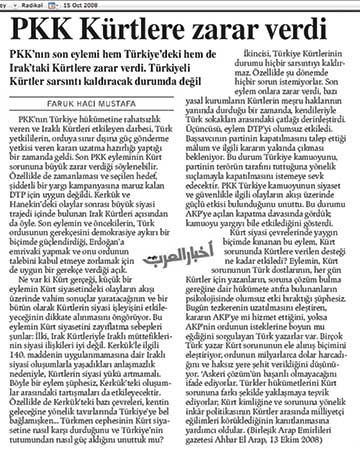 |
| January 15, 2008, Radikal - The PKK has damaged the Kurds | November 28, 2012 - Kurdish traders in revoit against the PKK |
 |
It is most important to be well acquainted with the flaws of character and logic of those who prefer to support the American, British, German and other secret states instead of the interests of Islam and Muslims. The most distinguishing features of these pseudointellectual sycophants is their sense of inferiority and the way they try to cover it up by putting on airs. Such people, who are frequently found in Asia and the Middle East, make numerous foolish concessions in order to acquire prestige and, even worse, encourage others to make such concessions, too. This character defect – that no Muslim who believes in God and who knows that all might and power belong to Him would ever exhibit – is spreading rapidly, by being encouraged by such types in most countries. It is of the greatest importance to perform an accurate analysis in order to take the necessary precautions before this turns into a societal disease and for these people’s moral and intellectual flaws to be exposed.
One of the main activities of intelligence organizations such as the CIA and think tanks that are the extensions of such organizations is to identify people they can control inside Middle Eastern and Asian societies. However, the CIA and other intelligence organizations tend not to deal with them directly, but use various think tanks or writers and go-betweens. Having identified such people with their sense of inferiority, they then win them over with clichéd language and ideas. They start approaching such people by saying things like, “You are very talented, you could be a great and famous author,” “You are very clever, your cleverness stands out among other people” or “You are different from the rest.” One of the tactics they frequently employ to influence people with that pseudointellectual sycophant character is to “manipulate” them by saying, “You are clever and modern. Muslims are misunderstood, it would have a great impact if people could see you.” Since they accurately identify the other person’s sense of inferiority and know that they can easily influence them with such manipulation they frequently resort to such ideas.
The next stage is to control the writings of such writers with their sense of inferiority. In fact, most of these people are not particularly talented writers anyway, but they are in one way or another made into authors. These people are first provided with an opportunity to write for the domestic market and later for international web sites or newspapers. They then become “famous.” And all these writings are supervised and generally totally rewritten by those who provide those opportunities. It begins with advice along the lines of “Do you not think it might be better to say such and such instead?” after which these writings gradually come to entirely support the views and interests of those sinister forces. That is the trickery lying behind dozens of articles in the international arena against a Muslim country or Muslims that obviously all share a common source.
At the basis of this system is the pseudointellectual sycophantic character of various writers in the Middle East and Asia. Let us now look at that pseudointellectual sycophant character in more detail:
 |
Inferiority complex is a widespread psychological problem in the Middle East and Asia. The complex derives from a person regarding himself as unworthy in the face of someone else, particularly someone whom he regards as superior. Many people from Asia and the Middle East are self-conscious right from the outset, due to the color of their skins, the different languages they speak or the fact that their resources are relatively less than those of the West. According to such people’s sickly mindset, being born in a Middle Eastern or Asian country, being an Arab, Pakistani, Indian, or Egyptian, is enough to feel inferior. Those born in the West must necessarily be superior to them.
Since they have no self-respect, these people are unable to develop a character that will be respected by others. They are literally pained by their feelings of inferiority in the face of those they regard as their “superiors” and they strive to cover that sense of inferiority up by striving to be happy and content. They are always trying to prove themselves to the people for whom they act as pseudointellectual sycophants. They therefore advocate not their own ideas, but those imposed on them by others, and imagine that they will enjoy greater esteem by doing so. They live, not a true life, but one shaped by the idea of, “if you do this, you will be admired.”
 |
Pseudointellectual sycophants are easily employable tools for intelligence agencies and the various think tanks that are extensions of them. The bodies in question generally use these people to raise issues they could not bring up themselves or that might provoke a negative reaction. For example, it would not be that significant among the international public if an American were to make comments against Turkey, and it would be most unwelcome among the Turkish public. Yet if a Turkish writer says things against Turkey, then that will be very sensational indeed. That is why the identification and training of pseudointellectual sycophants and making them ready for use is such an important process.
Once such pseudointellectual sycophant characters have been identified, they go through a lengthy and fastidious grooming process. These people are first approached by telling them, “You are an intellectual, and very different from the others.” Then they are gradually molded into the desired form. And during this process, it is the pseudointellectual sycophants’ immense efforts to gain approval that most serve the interests of their “lords and masters.” They begin influencing such a person by first praising his/her “intelligence” and “knowledge,” while inculcating that person with their own philosophies on the one hand and turning him or her into a writer on the other. Guidance along the lines of “This sentence on that subject is not exactly right,” or “Why not put it this way instead?” is actually part of the training. Through this detailed training these people are both turned into writers and indoctrinated with a specific philosophy. After minor corrections of sentences in their articles, this then turns into, “Why not let me write this section for you?”. Whole paragraphs are added or removed. During this time the pseudointellectual sycophant starts to learn what form the “ideal” written text should take. The result is a conveyor belt production of numerous papers, the work of a common mind and defending the same way of thinking. Many articles you read overseas in particular are prepared in that way.
 |
| German journalist Udo Ulfkotte |
Pseudointellectual sycophants’ education is not limited to their writings. They are also taught in fine detail how to behave in which environment, what to wear where, what subjects to make jokes about and how to react to events. They are told to adhere to this model if they want to be famous in the West, to be admired by those around them and to be regarded as “someone very important” in their own country. The eventual result is people with no beliefs, analyses or ideas of their own, and who are totally devoted to the beliefs, philosophies and life styles of their “lords and masters.”
At this point, the person imagines that they have made friends within a terribly important social circle. The idea that they have acquired such a circle of friends goes some way to lightening their inferiority complex. The people in charge of the system are also very careful to give that same impression. The German journalist Udo Ulfkotte, who admitted working for the CIA, summarized how the system works very clearly:
“The reason I agreed was that I came from a poor family. It was like a penniless child suddenly finding himself in a candy shop, and everything was free … Instead of money, they game me gifts that money could not buy. For example, an honorary citizenship award in the U.S. state of Oklahoma, gold watches, 5-star trips and even women. But most important of all I was being included in a 5-star business network. I could call for help whenever I was in any difficulty because I knew the highest-ranking figures in the network. You are chosen to be present in the same diplomatic environments as chancellors. You are placed next to influential people when you travel to foreign countries. They trust you. That was a lovely feeling.”
As we have seen, the system satisfies feelings such as “being famous,” “rubbing shoulders with famous people” and “being admired,” on the part of those whom it wishes to win over. Rubbing shoulders with cabinet ministers and members of Parliament, in other words giving the impression that “you are important, too,” is far more important than money to such people.
 |
The most sensitive point of people with an inferiority complex is “being taken seriously.” Those who know how to do that can easily make these people devoted to them through small gifts and gestures.
There is no need for expensive gifts in order to win over the pseudointellectual sycophant. While they may appear to be greedy, they do not actually expect a very lofty position or title. The most important thing to satisfy them is to receive the approval of those from whom they seek it because their true sense of inferiority is actually in the face of those people. Even if they become involved in the running of their own countries or become the CEO of a very large company, they are still unable to shake off that feeling of inferiority toward those to whom they behave as pseudointellectual sycophants. That means that they can never escape the desire to be liked and approved of by them.
Since their aim is to be liked, approved, honored and esteemed, hearing things like “Well done, that was a good piece of writing” or “That was a good speech,” cause them to walk on air. They have no hesitation about writing negative things about their own circles, loved ones or countries in order to hear the words, “Well done.”
 |
They ruthlessly denigrate and look down on everyone. The main subject of their writings generally consists of such denigration. They imagine that the more they speak out against Muslims, the more they foolishly criticize Muslims and the more they look down on Muslims, the more praise they will receive. They even tend to put on airs along the lines of, “Look, nobody can criticize Muslims as much as me. I know them best and I put them down best.” Or they imagine that the more they denigrate their own countries as “antidemocratic,” “backward” or “oppressive,” the more “first-rate” analyses they will be producing. The way that a great many writers denigrate their own countries to foreigners and look down their noses at their own people is based on sending the message that “I am different from them. I am in fact one of you.” The aim behind their writings and analyses is not to produce genuine criticisms and solutions, but to make propaganda and hear the words “Well done.”
Of course Muslims or the countries they live in may very well have attitudes deserving of criticism, and that criticism needs to be made. But the aim of these pseudointellectual sycophants is not to be instrumental in the correction of errors through criticism, but to earn the approval of the people whose approval they seek. That means that their writings and analyses and statements go no further than being propaganda for the circles in question.
 |
One of the most terrifying aspects of this clan-like order is the way that the pseudointellectual sycophants of the Middle East and Asia also offer up their sexuality to their “lords and masters.” Male or female, these pseudointellectual sycophants also attempt to earn the physical and sexual approval of those they regard as superior to them. Young girls of the Middle East and Asia are made available for the enjoyment of middle-aged people belonging to secretive organizations in the West with wide material means at their disposal.
In the same way that young girls who wish to become famous in the movie industry from time to time offer up their sexuality to people they believe can help them become stars, some Middle Eastern and Asian women with affectations and feelings of inferiority will also make their bodies available so that their articles can appear in a well-known newspaper or so their views can be heard on a well-known channel. It is known that many young Palestinian, Pakistani or Egyptian women seek to be a part of certain circles by building and using such relationships.
These young women who offer up their own sexuality for the sake of acceptance have also become included in a very strange system. They not only have to offer their sexuality to the lords and masters they are directly associated with, but also to other people those masters refer them to. Although this is a humiliating situation, it is not regarded as in any way extraordinary in those circles. One often sees an attractive Palestinian woman entering into a relationship with a well-known Israeli businessman, being made part of the circle she has wanted to enter all her life as a result and also entering into relations with other “lords and masters” in order to be able to remain in that circle. Many politicians are known to have taken advantage of this in murky U.S. and British politics. Many Middle Eastern and Asian girls are used in this painful way by personalities that include former ministers, former prime ministers and former lawmakers.
As the public read their daily papers or watch analyses on TV they are unaware of this painful truth. They imagine that these people are setting out their own ideas and thinking and researching for themselves. The fact is, however, that these people who have fallen under the influence of those circles, even in sexual terms, cannot possibly set out their own opinions or conclusions.
 |
Another one of the most striking features of Middle Eastern and Asian pseudointellectual sycophants is their submission to their masters’ beliefs. In other words, these people sign up to a belief system that is developed for them, rather than acting in the light of the truth inspired by God in the Qur’an, our Prophet (saas) and their own consciences. Since they completely subscribe to the worldview of their lords and masters, they also shape their beliefs on the basis of those masters’ opinions. They do not regard what God says as at all import ant – may God forbid – but regard what the secret state in America or Great Britain says as most significant. They do not apply what is written in the Qur’an, but implement everything the masters, whom they deify, say. They never think of the interests of Muslims or Islamic lands, but defend the interests of the circles, which they are enslaved right to the bitter end. That attitude is actually an external manifestation of their subconscious hatred for Muslims and the anger and inferiority they feel at being born in the Islamic world.
For example, the fact that Muslims may be harmed by an idea they espouse causes these people no distress at all. They place innocent Muslims in a terrible predicament under the guise of saying, “I am making a stand against terror” or “This is not part of the real Islam.” Defending the air attacks taking place in numerous countries, such as Iraq and Syria in particular, and also places like Pakistan, Yemen and Afghanistan, is one instance of this.
Aerial bombardments are a form of mass punishment that destroy everyone in the selected target area, making no allowances for women and children, or the sick and the elderly. It is a violation of both good conscience and human rights law. Whole towns and villages are not destroyed in any democratic country for the sake of catching people who have committed serious crimes. Nobody, not even a crazed killer, is killed by having bombs rained down on him, before he is even put on trial, in any democratic country. But when it comes to Islamic lands, however, these secret forces put the law and democratic values on the back burner. It is at this point that the responsibility for portraying such an inhumane and unconscionable policy as something “reasonable” to the public opinion falls to the pseudointellectual criticisms of the Middle East and Asia.
 |
These people passionately espouse tactics that wreak destruction and havoc in Islamic lands and lead to the deaths of large numbers of civilians under the name of the “fight against terror.” If their masters say, “Let us kill,” then they say, “Let us kill,” too. If their masters say, “Let us bomb people,” then they say “Let us bomb people,” too, or “Let us do even more than that.” Yet someone who really wants to fight terror will know that the intellectual foundation of terror needs to be demolished; he will know that no solution will be forthcoming through guns and bombs without intellectual activity, as well. Even more importantly, he will know that violence always leads to more violence. Yet what matters for these people is not the truth, but for the people these pseudointellectual sycophants serve to tell them, “Well done!” Merely for the sake of a “Well done!” and gaining even more approval, they enthusiastically espouse ruthless policies that are totally incompatible with the Qur’an and are willing to stand in the ranks of murderers.
Another striking example of the surrender of beliefs on the part of these pseudointellectual sycophants is the way they never refer to Islamic Unity and even, on the contrary, describe how in their eyes such a thing is impossible. Even though God commands Muslims to be united and even though numerous verses of the Qur’an tell them to be brothers and live in unity, these people insist on opposing unity. They reveal their opposition through rather cunning tactics. For example, they do not openly stand up and say, “Let us not be united” because they know that will attract criticism. They use fabricated hadiths instead. They use a false hadith attributed to our Prophet (saas) but which was never spoken by him, which reads, “Disagreement among my community is a mercy.” They thus seek to influence Muslims by saying “Look, even our Prophet (saas) says there is no need to be united.” Yet our Prophet (saas) would never say anything that was incompatible with the Qur’an. He would never say there is mercy in division when dozens of verses of the Qur’an command Muslims to be united. Unity is a blessing for Muslims because that is God’s command. Yet for people with a pseudointellectual character, it is not God’s command that matters, but the interests of the masters whose satellites they are.
 |
Close inspection will also reveal the presence of the pseudointellectual sycophant character, which is so widespread in the Middle East and Asia, also in Turkey. One of the most distinguishing characteristics of these people, who live far removed from the spiritual values of their own country – or who, to be more accurate, imitate foreign culture – who are ignorant of Turkey’s shared values, who seek to give the impression of being unaware of popular values and beliefs, who despise ordinary people and regard themselves as terribly important and who analyze events from a remarkably narrow perspective is that they care absolutely nothing for Turkey’s interests.
Just like the examples from other countries, these people denigrate Turkey at great length, make comments contemptuous of the Turkish people and, even more painfully, passionately espouse ideas that may damage the country in the long term, all for the sake of a “Well done!” The recent increase in writings and statements that seek to portray the PKK as a group of freedom fighters, that try to bring Turkey to heel using the threat of the PKK, that threaten Turkey along the lines of “Either you support the PKK or else you must suffer the consequences,” and that prepare the way for the breaking up of the country is one indication of this. These people, who espouse the ideas served up to them by various think tanks in the West on a word-for-word basis, never stop to think where the line they espouse may lead. They espouse whatever they are indoctrinated with for the sake of approval, fame or even just seeing their name under a column in a foreign newspaper. When they promote these ideas they imagine that they will be perceived as ultra-modern, capable of seeing what ordinary people cannot and making the most accurate analyses. The fact is, however, that they are people, who merely recite what is told to them, have lost all character and self-esteem and are regarded with pity by the majority of people.
Pseudointellectual sycophants also compete with one another in terms of pseudointellectual sycophancy. The competition involves seeing who can secure most “well dones” and who can be most pseudointellectually sycophantic. In order to win that contest, they entirely abandon the interests of their own country and merely wonder how to make themselves even more popular. It is this competition over pseudointellectual sycophancy that lies behind the way they shower praise upon the PKK, even though they know it is a traitorous terror organization that still continues to martyr our troops and police, raise the subject of an amnesty for terrorists and even shamelessly advocate the idea of Turkey providing the terrorists with weaponry. The anti-Turkish writings, or comments within those writings, that frequently appear in the foreign press, are a manifestation of that competition. The pseudointellectual sycophancy contest waged out of a hope that “maybe they will include me among them and then my name will be mentioned in the same breath as theirs,” will eventually cause damage that leads the person concerned to sign up to all kinds of ugliness; instead of sacred values such as their own cause or ideal, the family, nation and country, these people are worried about what their “masters” think.
Another humiliating behavioral defect that the people in question learn from their masters is that of putting on airs.
 |
Putting on airs is a behavioral and moral defect that is widespread in Western countries. These people, whose language consists of a mixture of showiness and “I know best” attitude have a common tone of voice, accentuation, way of sitting and placing the spotlight on themselves. Their desire is to emphasize this state of being “rather special,” which regards themselves as different to other people, in their every gesture and action. Some of the best known aspects of putting on airs are using exaggerated facial expressions, insisting on using foreign words all the time when speaking, speaking while chewing gum, describing things they would never normally like in terms of admiration, describing places they may never have been to as if they knew them well and people they may never have met as if they were close friends, and talking about music they have never heard as if they liked it very much and about films and art they have never seen or understood as if they understand them very deeply. Being able to sit in the lobby of a five-star hotel, blowing the smoke from a cigar given to them as a gift by that hotel into other people’s faces, posing with a wine glass in their hand and being seen at the entrance to a famous restaurant are all terribly important to people who put on airs.
Details about the routine matters in the lives of high-quality and noble people are of exaggerated importance in the lives of those who put on airs. They imagine they can become esteemed and gain importance through them. They make every effort to show that importance they imagine they possess to other people. Every action in the philosophy of putting on airs is intended to tell those whom the individual admires so greatly that “I am one of you.” That is why in one sense, putting on airs represents a common language and philosophy among superficial folk. Someone who puts on airs will immediately recognize another of that ilk, and someone who puts on airs will best understand the language of another of that kind.
 |
Although putting on airs is an embarrassing and humiliating state of mind, many ignorant people feel a sincere admiration for those who do so. Those who put on airs from high school on enjoy great prestige among other people, while modest and well-mannered people are generally undervalued. That is the reason why difficult, spoiled and showy people enjoy great esteem in high school. Putting on airs then continues to grow apace after high school. While the pop music groups they listen to, the concerts people go to and what they buy in the shops are all tools for putting on airs in school years, in the years that follow it is temporary phenomena such as one’s social circle, the places one chooses to go on holiday, the exhibitions one attends, rank and position, the car one drives and the area of town one lives in, that acquire importance. Each one of these is used as a tool to psychologically put down more humble folk.
Putting on airs is a common philosophy between pseudointellectual sycophants in the Middle East and Asia and their masters. However, pseudointellectual sycophants never put on the airs they learned from their masters in front of them. They only display such attitude to put down ordinary people whom they regard as beneath them and inferior. In the presence of their masters, they are very humble and sycophantic; they would never think of putting on airs to them. It is not hard to imagine the kind of language that someone in Egypt, Bangladesh or Palestine who has seen Europe will use, or the way he will look down on ordinary people. People who live in a state of great feelings of inferiority in Europe or America, and slavishly do everything they are told, suddenly develop an entirely different character when they return to their own countries, as if that despised person had not really been them at all. That is another manifestation of putting on airs. What is embarrassing is that poor, ordinary people are generally mightily impressed by such airs and regard the person concerned as terribly special.
Yet the moral values and qualities that should really be admired are those of the believer. The character of the believer, who knows that God is the Lord of all blessings, that power and might belong to Him alone and who is fully submitted to Him, is as steady as a rock. It is sturdy and unshakeable. That person knows that he is dealing with shadow entities and that God witnesses him at all times. He never stoops to the facile. He is ultra modern and high-quality. He lives by the moral values desired by God, not by those of the people who would wish to shape him. He knows that the lords and masters, whom the pseudointellectual sycophants regard as very important and enslave themselves to, are just helpless servants of God and mortal beings. The respect and value he places on someone is directly proportional to that person’s love and fear of God. He will never be rude to anyone, but he knows how humiliating it is to feel inferior in the face of weak and helpless human beings. The only entity to Whom the believer will sincerely submit himself is God.
 |
Looking at the present picture it is clear that the PKK is engaged in a comprehensive stratagem intended to bring global support behind it and is trying to use the climate in the Middle East as a starting point for the communist world state it is planning. The West’s stance at this point is very important: Some secret forces are without doubt well-aware of what is going on within the Great Middle East Project. They therefore know full well the kind of policy the PKK has adopted and that it exists for the sake of its Leninist ideology. Even though they are themselves opposed to communism, the secret forces in question support the existence and strengthening of the PKK in the region. That is solely because, with this policy, they wish to establish a designated ally, or a “base” that belongs to them, to put it more accurately, by making use of a Leninist terror organization or any other way. The aim has never been one of “contributing to the Kurds’ fight for existence.” As a matter of fact, the first thing the forces in question will do when the objective is reached will be to chuck the PKK and the Kurds in the region aside; their real objective is to seize control of the Middle East and prepare for an apocalyptic war. Those people in the Western world who are unknowingly backing this project must become aware of this state of affairs.
This is the plan. But this is very likely not the way things will work out. As we have seen in detail throughout this book, the region in question will become the basis for a communist world state. Although the region is under the control of secret imperialist forces, communist violence will manifest itself and with the support of communists from across the world, that step forward, one that has been planned for such a long time, will be taken. The capitalist world, which in one sense is allied against communism, will have brought about a communist world state by its own hands, albeit unwillingly.
If the true nature of the PKK in Turkey, the PYD in Syria and the PJAK in Iran is not properly grasped, if their true objective is not realized and if dangerous stratagems are enacted in this key part of the Middle East, despite all the warnings, this will lead to disaster for the entire world. The communists’ ultimate aim has always been to secure a state in this strategic but also very fragile region, from which they can reach out to the rest of the world; with the backing of imperialist forces they are moving step by step closer to achieving that. Imperialist forces must not support a savage system that will end up stabbing them in the back. Astonishing things are happening in the Middle East today. A communist state that emerges out of such a plan will grow strong and soon become able to spread terror across the world. Under such circumstances the West will be unable to afford the luxury of sitting back and saying, “Let us not get involved, and let events just take their course in the Middle East,” because the scourge will definitely reach out to everywhere. We of course have no desire to see such horror in the Middle East or the West. However, that is probably what will happen given the facts as they now stand and it is essential that we issue the appropriate warnings against this threat. The aim here is not to present a pessimistic perspective, but to open people’s eyes.
1. http://ajanshaber.com/-ypg-pkk-tarafindan-kuruldu-haberi/132098
2. http://ajanshaber.com/-ypg-pkk-tarafindan-kuruldu-haberi/132098
3. http://www.timeturk.com/tr/2013/08/01/esed-in-zindanlarindan-ciktik-pyd-zindanlarina-girmeyiz.html#.VJZcxsBGo
4. http://www.haber10.com/haber/540076/
5. http://www.hrw.org/news/2014/06/18/syria-abuses-kurdish-run-enclaves
6. Questions & Answers to American Trade Unionists: Stalin's Interview With the First American Trade Union Delegation to Soviet Russia, Pravda September 15, 1927; http://www.marxists.org/reference/archive/stalin/works/1927/09/15.HTM
7. Komünistler Nasıl Yalan Söyler (How do communists Lie?), Dr. Fred C. Schwarz, p. 215-216
8. Necati Alkan, PKK’da semboller, aktörler ve kadınlar (Symbols, actors and women in the PKK), 2012, Karakutu Publishing, p. 104
9. Necati Alkan, PKK’da semboller, aktörler ve kadınlar (Symbols, actors and women in the PKK), 2012, Karakutu Publishing, p. 256
10. Necati Alkan, PKK’da semboller, aktörler ve kadınlar (Symbols, actors and women in the PKK), 2012, Karakutu Publishing, p. 256
11. Necati Alkan, PKK’da semboller, aktörler ve kadınlar (Symbols, actors and women in the PKK) , 2012, Karakutu Publishing, p. 258
12. Necati Alkan, PKK’da semboller, aktörler ve kadınlar (Symbols, actors and women in the PKK), 2012, Karakutu Publishing, p. 91
13. Necati Alkan, PKK’da semboller, aktörler ve kadınlar (Symbols, actors and women in the PKK), 2012, Karakutu Publishing, p. 77
14. http://www.washingtonpost.com/blogs/worldviews/wp/2014/10/27/turkey-still-thinks-this-guy-holding-a-baby-bear-is-a-terrorist-is-he
15. http://www.washingtonpost.com/blogs/worldviews/wp/2014/10/27/turkey-still-thinks-this-guy-holding-a-baby-bear-is-a-terrorist-is-he